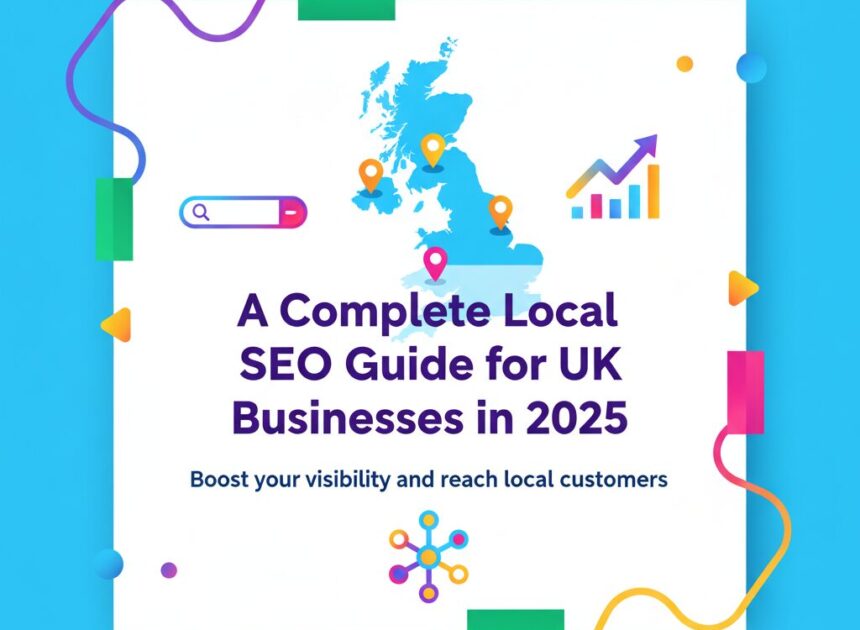Did you know that a staggering 97% of people learn more about a local company online than anywhere else? In today’s digital-first world, your customers in London, Manchester, Glasgow, and every village in between are searching online for services “near me.” This makes the local digital high street incredibly crowded. For British businesses, simply having a website is no longer enough; you need to be visible the moment a potential customer searches for what you offer. Standing out requires a sharp, strategic approach.
This is where local Search Engine Optimization (SEO) comes in. It’s the art and science of making your business more visible in the local search results on Google. This comprehensive local seo guide UK is your step-by-step plan for 2025. We’ll break down everything you need to do to connect with more local customers, drive foot traffic, and ultimately grow your business.
Why Local SEO is a Non-Negotiable for UK Businesses
Local SEO isn’t just another marketing buzzword; it’s a fundamental necessity for any business serving a specific geographic area. It’s the difference between being the first business a local customer finds or being lost on the tenth page of Google’s search results.
Understanding the “Near Me” Phenomenon in the UK
The way UK consumers find businesses has fundamentally changed. Think about your own behaviour. When you need a plumber, a café, or a solicitor, what’s the first thing you do? You likely pull out your phone and search for “plumber near me” or “best coffee in Brighton.” Billions of these “near me” searches happen every year, and they have incredibly high purchase intent. These are not people just browsing; they are actively looking for a solution right now. If your business isn’t optimized for these searches, you are invisible to a huge pool of ready-to-buy local customers.
The Tangible Benefits: More Foot Traffic, Phone Calls, and Local Customers
Effective local SEO translates directly into real-world results. When your business appears in Google’s “Local Pack” (the map and three listings at the top of the results), you will see a direct increase in:
- Foot Traffic: More people will click for directions and visit your physical location.
- Phone Calls: The “click-to-call” button on your profile makes it effortless for potential customers to contact you.
- Website Visits: Your optimized profile will drive qualified, local traffic to your website.
- Enhanced Trust: A well-optimized, professional online presence with positive reviews builds immediate credibility with local searchers.
Key Ranking Factors for Local Search in 2025
Google’s algorithm for local search is complex, but it boils down to three core pillars:
1. Proximity: How close is your business to the person searching? This is something you can’t change, but you can ensure your location information is perfectly accurate.
2. Relevance: How well does your online profile match what the customer is searching for? This involves using the right keywords and business categories.
3. Prominence: How well-known is your business? Google determines this based on factors like online reviews, the number of times your business is mentioned across the web (citations), and links from other local websites.
This guide will show you how to master the factors you can control: relevance and prominence.
The Cornerstone: Mastering Your Google Business Profile UK
Your Google Business Profile (GBP) is, without a doubt, the single most important element of your local SEO strategy. It’s the free, powerful listing that appears in Google Maps and the Local Pack. Think of it as your modern-day Yellow Pages ad, but infinitely more powerful.
Setting Up and Verifying Your Google Business Profile UK Account
First things first. If you haven’t already, you need to claim and verify your Google Business Profile UK listing.
1. Go to google.com/business and sign in with a Google account.
2. Search for your business name and address. If a profile exists, you can claim it. If not, you can create a new one.
3. Fill out all the requested information as accurately as possible. Your business name, address, and phone number must be identical to how they appear on your website and other directories.
4. Verify your business. Google will typically send a postcard with a verification code to your business address to confirm it’s a legitimate, physical location. This step is crucial and cannot be skipped.
A Deep Dive into Optimizing Every Section
A basic profile isn’t enough. You need to complete every single section to give Google the maximum amount of information about your business.
- Categories: Choose the most specific primary category possible (e.g., “Central Heating Engineer” instead of just “Plumber”). Then, add all other relevant secondary categories.
- Services/Products: List everything you offer. Add detailed descriptions and prices if applicable. This helps you rank for specific service-related searches (e.g., “boiler repair in Leeds”).
- Photos: Add high-quality, real photos of your business exterior, interior, team, and your work in action. Ditch the stock photos. Real images build trust.
- Attributes: Select all relevant attributes. These can include things like “Wheelchair-accessible entrance,” “Free Wi-Fi,” or “Women-led.” This helps you appear in more filtered searches.
Leveraging GBP Features: Posts, Q&A, and Products for a British Audience
Your GBP is not a “set it and forget it” tool. You need to engage with it regularly.
- Posts: Use GBP Posts to share updates, special offers, or news. This is perfect for announcing a “Bank Holiday Sale” or showcasing a recently completed project. Posts stay live for seven days and are a great way to keep your profile fresh.
- Q&A: Proactively add your own frequently asked questions and answer them. This lets you control the narrative and provide helpful information upfront, such as “Do you offer free quotes?” or “What are your weekend opening hours?”.
- Messaging: Enable the messaging feature to allow customers to contact you directly from your profile. Responding quickly is key.
The Importance of Geo-tagging Photos with UK Locations
Before you upload photos to your GBP, it’s a great practice to geo-tag them with your business’s latitude and longitude. This embeds the location data directly into the image file, sending another strong signal to Google about where your business is physically located. You can use free online tools to do this easily.
On-Page SEO: Optimizing Your Website for Your Local Area
While GBP is critical, your website is the ultimate destination where you can convert visitors into customers. Optimizing your site for local search is essential.
Local Keyword Research: Finding What Your UK Customers are Searching For
You need to understand the exact phrases your local customers are using. Think beyond just your service. They’re searching for:
- [Service] in [City/Town]: e.g., “divorce solicitor in Birmingham”
- [Service] in [Postcode Area]: e.g., “emergency plumber in SW19”
- [Service] near [Landmark]: e.g., “restaurants near the Tower of London”
Use tools like Google Keyword Planner or simply type queries into Google and see what “autocomplete” suggests. This will give you a solid list of keywords to target.
Creating Location-Specific Landing Pages
If you serve multiple areas, creating a unique page for each location is one of the most powerful local SEO tactics. For example, a roofing company based in Manchester that serves the surrounding towns should have separate pages for:
- Roofing Services in Manchester
- Roofing Services in Bolton
- Roofing Services in Oldham
Each page should feature unique content relevant to that specific area, such as testimonials from local clients, mentions of local landmarks, or case studies of jobs completed in that town.
Integrating Local Signals into Your Content and Meta Tags
Your location should be woven naturally into the fabric of your website.
- Title Tags and Meta Descriptions: Your most important pages should include your primary service and location. For example, <title>Expert Tax Accountants in Bristol | Smith & Jones Ltd</title>.
- Headers and Body Content: Mention your service areas throughout your text.
- Footer: Ensure your full business name, UK address, and local phone number are in the footer of every page.
Implementing Local Business Schema Markup
Schema markup is a piece of code you add to your website to help search engines understand your content better. For local SEO, the LocalBusiness schema is vital. It explicitly tells Google your business’s name, address, phone number, opening hours, and more, in a language it can easily process. Make sure your address and phone number are formatted correctly for the UK (e.g., using the +44 country code for your phone number). You can use Google’s Structured Data Markup Helper to generate the code.
Building Authority with UK-Specific Citations and Directories
A citation is any online mention of your business’s Name, Address, and Phone number (NAP). Consistent citations across reputable websites build your business’s prominence and verify your location for Google.
What is NAP (Name, Address, Phone Number) and Why Consistency is Crucial
Your NAP is your digital fingerprint. It must be 100% consistent everywhere it appears online. A tiny variation like using “Street” on one site and “St.” on another, or “Ltd” vs “Limited,” can confuse search engines and dilute your local authority. Decide on one standard format and stick to it religiously.
The Top UK Business Directories to Be Listed On
Getting listed in high-quality, authoritative UK directories is a must. These are some of the most important ones to start with:
- Yell.com
- Thomson Local
- The Independent Business Directory
- Scoot
- 192.com
- FreeIndex
- Your local Chamber of Commerce
Auditing and Cleaning Up Your Existing UK Citations
It’s very likely your business is already listed on several sites, and some of the information might be outdated or incorrect. You need to conduct a citation audit. Search for your business online and find any inconsistencies in your NAP. Reach out to the directory websites to correct any errors you find. This cleanup process is essential for building a strong, trustworthy local foundation.
Earning Trust: Reviews and Local UK Backlinks
Prominence is heavily influenced by what others say about you. This comes in the form of customer reviews and links from other local websites.
Proven Strategies to Generate More Positive Online Reviews from UK Customers
Reviews are a massive ranking factor and are critical for converting searchers into customers. You need a proactive strategy to encourage them.
- Just Ask: The simplest method is often the most effective. Ask happy customers in person if they would mind leaving a review.
- Email & SMS Follow-ups: Send a polite follow-up message a day or two after a service, including a direct link to your Google Business Profile review page.
- Use QR Codes: Place a QR code on your business cards, receipts, or at your premises that links directly to your review profile.
- Respond to All Reviews: Thank customers for positive reviews and address negative reviews professionally and politely. This shows you are engaged and value customer feedback.
How to Build High-Quality Local Backlinks in the UK
A backlink is a link from another website to yours. When a reputable local website links to you, it acts as a vote of confidence, boosting your authority.
Ideas for Local Link Building
Getting these valuable links requires a bit of creativity and community engagement.
- Sponsor a Local Team or Event: Sponsor a local youth football team, a charity 5k run, or a community fair. In return, you’ll almost always get a link from their website.
- Partner with Nearby Businesses: Work with non-competing businesses in your area. A wedding planner could get a link from a local florist’s website, and vice versa.
- Engage with UK Bloggers and News Sites: Reach out to local bloggers or the online version of your local newspaper. Offer to provide an expert quote or share a newsworthy story about your business.
Content Strategy for the UK Market
Your website’s content shouldn’t just be about your services. It should demonstrate that you are an active, authoritative member of your local community.
Blogging About Local News, Community Events, and Council Updates
Create blog posts that are genuinely useful for your local audience. An estate agent could write about new local council planning permissions, or a café could create a guide to an upcoming local food festival. This positions you as a local expert and attracts relevant, local traffic.
Creating Content Around British Holidays and Cultural Events
Tailor your content to the UK calendar. A gift shop could write a “Mother’s Day Gift Guide for Nottingham,” or a restaurant could create a special menu and blog post for “Burns Night in Edinburgh.” This type of content is highly relevant and shareable.
Developing Helpful Resources for Your Local Community
Think about what resources would be valuable to people in your area. A veterinary clinic could create a guide to “The Best Dog-Friendly Parks in Cardiff,” or a bike shop could map out “The Top 5 Cycling Routes in the Peak District.” This type of content attracts natural links and establishes you as the go-to local authority.
Your Ultimate Local SEO Checklist UK
Feeling overwhelmed? Don’t be. Here’s a straightforward local seo checklist UK to keep you on track.
Foundational Setup
- [ ] Claim and fully verify your Google Business Profile UK.
- [ ] Complete every single section of your GBP profile.
- [ ] Establish a 100% consistent NAP (Name, Address, Phone Number).
- [ ] Add LocalBusiness schema markup to your website.
- [ ] Create location-specific pages on your website if you serve multiple areas.
- [ ] Build citations on the top 10 UK business directories.
Monthly SEO Tasks for Continuous Growth
- [ ] Publish at least 2 new GBP Posts.
- [ ] Upload 3-5 new, geo-tagged photos to your GBP.
- [ ] Proactively seek 3-5 new customer reviews.
- [ ] Respond to all new reviews (positive and negative).
- [ ] Write and publish one piece of locally-focused content (blog post, guide, etc.).
- [ ] Check for and clean up any new, inaccurate citations.
Technical SEO Checks for Local Websites
- [ ] Ensure your website is mobile-friendly.
- [ ] Check your website’s loading speed using Google PageSpeed Insights.
- [ ] Confirm your NAP is present and correct in your website’s footer.
- [ ] Make sure your location pages are indexed by Google.
Measuring Success and When to Seek Help
Local SEO is an ongoing process, not a one-time task. It’s important to track your progress and know when you might need expert help.
Key Performance Indicators (KPIs) to Track for Local SEO
Don’t just look at your ranking. Focus on the metrics that actually impact your bottom line.
- Google Business Profile Insights: Track how many people found you via search vs. maps, and monitor the number of website clicks, phone calls, and direction requests.
- Local Organic Traffic: Use Google Analytics to see how much traffic is coming to your location pages from search engines.
- Keyword Rankings: Monitor your position in Google’s Local Pack and Maps for your most important keywords.
Signs It’s Time to Invest in Professional Local SEO Services UK
You might be a master of your trade, but not an SEO expert. It might be time to call in the professionals if:
- You are too busy running your business to implement these strategies consistently.
- Your results have plateaued, and you don’t know how to improve further.
- Your local competitors are consistently outranking you.
- You want to accelerate your growth and get results faster.
How to Choose the Right UK-Based SEO Agency
If you decide to seek help, look for an agency that specializes in local SEO and is based in the UK. They will have a better understanding of the local market, UK-specific directories, and consumer behaviour. Ask for case studies of businesses similar to yours and be clear about your goals. Investing in professional local seo services UK can be the best decision you make for your business’s online growth.
Conclusion
Dominating your local search market in 2025 is entirely achievable. By following this local seo guide UK, you can build a powerful and sustainable online presence. The core pillars are simple but require consistent effort: a perfectly optimized Google Business Profile UK, targeted on-page optimization on your website, a clean and consistent profile across UK-specific directories, and a content strategy that proves you’re the local expert.
Use the checklists in this guide to start making improvements today. If you’re ready to take your local visibility to the next level but need expert guidance, get in touch for a professional local SEO audit. We can help you turn local searches into loyal customers.







